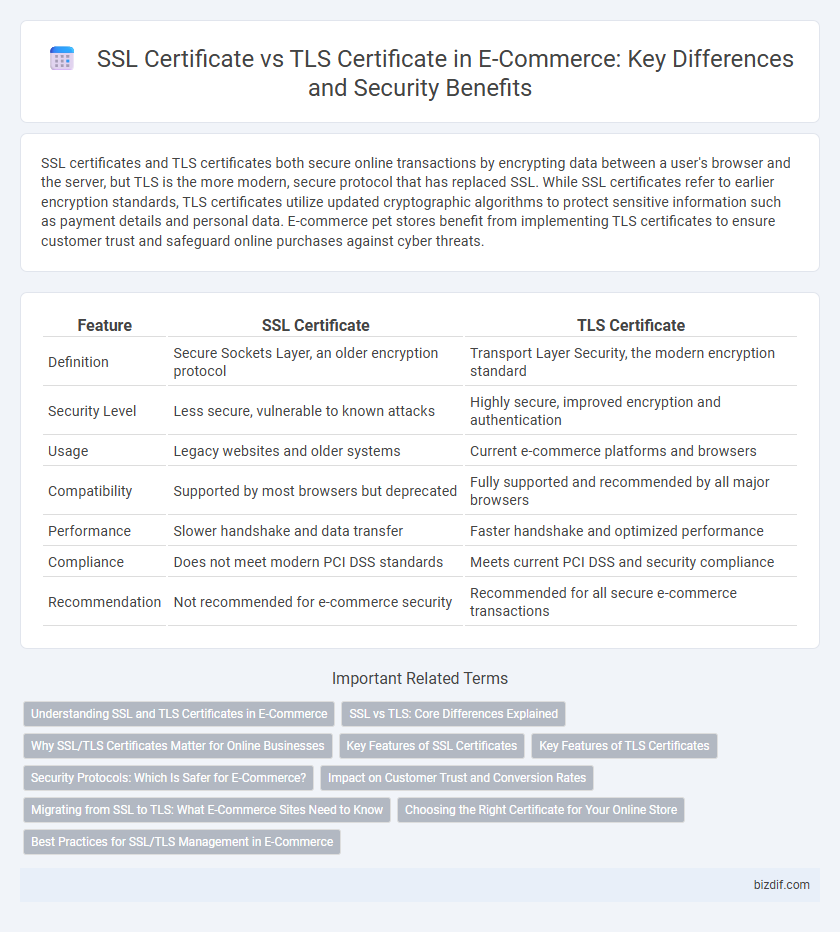SSL certificates and TLS certificates both secure online transactions by encrypting data between a user's browser and the server, but TLS is the more modern, secure protocol that has replaced SSL. While SSL certificates refer to earlier encryption standards, TLS certificates utilize updated cryptographic algorithms to protect sensitive information such as payment details and personal data. E-commerce pet stores benefit from implementing TLS certificates to ensure customer trust and safeguard online purchases against cyber threats.
Table of Comparison
| Feature | SSL Certificate | TLS Certificate |
|---|---|---|
| Definition | Secure Sockets Layer, an older encryption protocol | Transport Layer Security, the modern encryption standard |
| Security Level | Less secure, vulnerable to known attacks | Highly secure, improved encryption and authentication |
| Usage | Legacy websites and older systems | Current e-commerce platforms and browsers |
| Compatibility | Supported by most browsers but deprecated | Fully supported and recommended by all major browsers |
| Performance | Slower handshake and data transfer | Faster handshake and optimized performance |
| Compliance | Does not meet modern PCI DSS standards | Meets current PCI DSS and security compliance |
| Recommendation | Not recommended for e-commerce security | Recommended for all secure e-commerce transactions |
Understanding SSL and TLS Certificates in E-Commerce
SSL certificates and TLS certificates are essential for securing e-commerce transactions by encrypting data between the customer's browser and the online store. TLS is the modern, more secure successor to SSL, offering enhanced encryption protocols that protect sensitive information like credit card details and personal data. Implementing TLS certificates boosts consumer trust and compliance with payment card industry (PCI) standards, ensuring safe and reliable online shopping experiences.
SSL vs TLS: Core Differences Explained
SSL certificates and TLS certificates both secure e-commerce transactions by encrypting data between web servers and browsers, but TLS is the more advanced and secure protocol replacing SSL. SSL certificates, originally designed in the 1990s, have known vulnerabilities, while TLS provides stronger encryption algorithms and improved security features essential for protecting sensitive payment and customer information. E-commerce platforms must prioritize TLS certificates to ensure compliance with industry standards like PCI DSS and maintain consumer trust in online payment processes.
Why SSL/TLS Certificates Matter for Online Businesses
SSL and TLS certificates encrypt sensitive customer data during online transactions, safeguarding against cyber threats and data breaches. These certificates establish trust by authenticating the business's identity, enhancing customer confidence and boosting sales conversions. Compliance with industry standards like PCI DSS also mandates the use of SSL/TLS certificates, making them essential for secure e-commerce operations.
Key Features of SSL Certificates
SSL certificates ensure secure data transmission by encrypting sensitive information such as credit card numbers and personal details, which is crucial for e-commerce websites. Key features include authentication of the website's identity, data integrity to prevent tampering, and strong encryption protocols that protect customer data from cyber threats. SSL certificates also boost customer trust and improve search engine rankings by enabling HTTPS on e-commerce platforms.
Key Features of TLS Certificates
TLS certificates provide enhanced security for e-commerce websites by encrypting data transmitted between the server and customers, ensuring protection against interception and data breaches. Key features of TLS certificates include support for modern encryption algorithms, improved authentication methods, and better resistance to cyberattacks compared to traditional SSL certificates. These certificates also enable HTTP/2 support and faster handshakes, resulting in optimized website performance and user experience.
Security Protocols: Which Is Safer for E-Commerce?
TLS certificates provide enhanced encryption and improved security features compared to SSL certificates, making them the preferred security protocol for protecting sensitive e-commerce transactions. TLS (Transport Layer Security) updates address vulnerabilities found in SSL (Secure Sockets Layer), ensuring safer data transmission between web browsers and servers. E-commerce platforms that implement TLS certificates reduce the risk of data breaches and build greater customer trust through robust encryption standards.
Impact on Customer Trust and Conversion Rates
SSL and TLS certificates both secure data exchanged between e-commerce sites and customers, but TLS is the more advanced protocol, offering stronger encryption and enhanced security. Implementing TLS certificates significantly boosts customer trust by ensuring safer transactions, which directly correlates with higher conversion rates and reduced cart abandonment. E-commerce platforms leveraging TLS see improved search rankings and brand credibility, further driving sales growth.
Migrating from SSL to TLS: What E-Commerce Sites Need to Know
E-commerce sites must prioritize migrating from SSL to TLS certificates to ensure enhanced security and protect sensitive customer data during online transactions. TLS protocols offer stronger encryption methods and improved authentication compared to obsolete SSL versions, reducing risks of cyberattacks and data breaches. Implementing TLS certificates maintains PCI DSS compliance and fosters customer trust by providing secure shopping environments essential for online business success.
Choosing the Right Certificate for Your Online Store
Choosing the right certificate for your online store hinges on understanding that SSL (Secure Sockets Layer) is the predecessor to TLS (Transport Layer Security), with TLS offering enhanced encryption and security protocols. TLS certificates are the industry standard for e-commerce websites, ensuring robust protection of sensitive customer data such as payment information and login credentials. Investing in a TLS certificate not only boosts customer trust but also improves search engine rankings and compliance with data protection regulations like PCI DSS.
Best Practices for SSL/TLS Management in E-Commerce
Implementing robust SSL and TLS certificates is essential for securing e-commerce transactions and protecting customer data from interception and fraud. Best practices include regularly updating certificates, enabling strong encryption protocols such as TLS 1.3, and automating certificate renewal to prevent service disruptions. Monitoring SSL/TLS configurations with tools like Qualys SSL Labs ensures compliance with industry standards and enhances website trustworthiness.
SSL Certificate vs TLS Certificate Infographic

 bizdif.com
bizdif.com